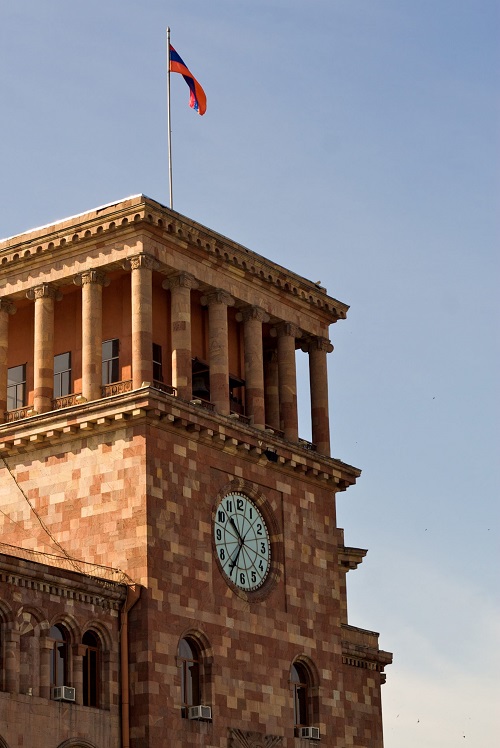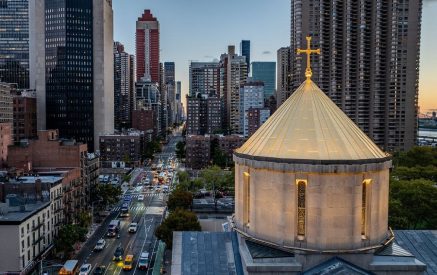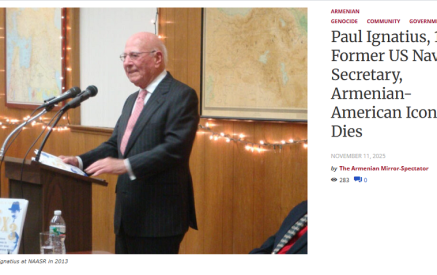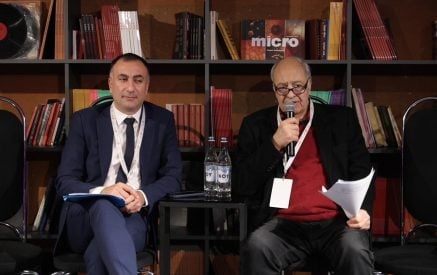The Armenian Weekly. We are raised in the diaspora with this romantic perception that everything Armenian is good. In most cases that’s true. We have a deep faith, a beautiful language and a respected culture. Our “clannish” behavior is a subject of humor, but has also been a major contributor to our continued existence. We look for each other and take great joy in that discovery. Saroyan’s words ring true as communities of Armenians continue to blossom on this planet. If a critical mass were not deeply committed to preserving who we are for today and the future, we would experience full assimilation. That’s how it works in a dispersed state: struggling to maintain a heritage with damaged roots from a genocide.
Nevertheless, most of us in the current generations were fortunate enough to watch our parents and grandparents toil with selfless devotion to build and support an Armenian life through communal activities. This environment in the United States, Canada, Europe, South America and the Middle East shaped our view that great value comes from our Armenian identity. The notion of greed and corruption was either a foreign concept or ignored as remote exceptions, blinded by our devotion. How could we possibly see any weaknesses when our community role models were those who raised us? Behind the pride and simplicity of youth, there were the stains of disunity and community upheavals caused by ego-based conflicts. Despite these occasional distractions, our communities have been a strong foundation with infrastructure, wealth, generational transference and a yearning for the homeland.
In 1991, when Armenia gained its sovereignty and Artsakh a de facto independence, the diaspora was ready to embrace the dream. The expectations were, unfairly, high as the diaspora inevitability expected what they had experienced in their host countries. Similar to all former Soviet republics, Armenia suffered a power transition that enabled the oligarchs and corruption of the next 25 years. Still, hope prevailed as we believed the “Soviet” culture would pass.
The three attributes of leadership necessary for an emerging democracy are integrity, political will and competence. Our problem can be summarized, in its simplest terms, by stating that Armenia has not experienced all three concurrently in its almost 30 years of independence. Acquiring power and establishing the trust of the people are independent variables. There has been no shortage of those desiring and maintaining power; credibility and trust, however, have been lacking. Levon Ter Petrosyan, the first president of Armenia, inherited a massive challenge with transitional unemployment from the Soviet era and resulting emigration. His desire to resolve the Artsakh conflict with compromise drove him from office. Ironically, his advocacy of compromise came to pass through a criminal assault on the innocent after compromise was rejected. The Kocharyan and Sargsyan eras were filled with electoral corruption and economic despair. From a leadership perspective, they were “Moscow friendly,” but there were significant issues of credibility, corruption and ambivalence by the citizens. In fact, by 2017, many Armenians felt a sense of hopelessness in their ability to impact their future. It was this environment that led to the “Velvet Revolution” and ushered in a period of recovered hope and optimism. Of course, very few actually knew Nikol Pashinyan and his ability to govern. As his My Step alliances swept a majority in parliamentary elections, we witnessed the impact of an emotional tidal wave. The euphoria of the street revolution and the hope of ending corruption were so strong that the long-controlling Republican Party did not win a single seat in the new parliament. The stars seemed to be aligned for Pashinyan…or so we thought. He had the confidence of the people, a ruling majority in the parliament and a nation ready for change. The issue of his competence to govern was unanswered, but most assumed that the positive mood and desire for change would bend the learning curve. There were clear signs of progress with domestic policy issues such as anti-corruption, social equality and infrastructure. Lurking in parallel were foreign policy strategies that tend to be less visible on a daily basis. It is clear now that Armenia did not seriously prepare for the Azeri/Turkish ambush despite many warning signs. That, along with the Pashinyan government’s refusal to compromise on the diplomatic front with Artsakh, created a dangerous isolation that left Armenians alone with yet another Turkish onslaught.
Read also
The government clearly miscalculated the resolve of the major players for Armenia to return the liberated territories while the rest of us interpreted the refusal as a patriotic gesture. The Turkish criminal assault was not a full surprise. The warning signs were evident: violent rhetoric from the Turkish alliance, war exercises with equipment and resources remaining in Azerbaijan, and Turkey’s unchallenged expansionist policy in no less than seven areas of the region. Our preparation both militarily and diplomatically was misaligned with this reality. Inexperience? Incompetence? It was a leadership failure. Once again the fox in the henhouse got away with its crimes because of the Russian chess game, western ambivalence and Armenian naivety.
Armenia is a small nation with limited natural resources in a neighborhood with no close allies. This is not a new revelation. The argument could be made that it has been this way for literally thousands of years. If our survival is based on self-reliance, why has our leadership failed to meet the three criteria outlined earlier (integrity, political will and competence)? Why have our leaders failed to build an intelligence service and military capability to defend the borders in the last 30 years? Why is it that Armenia can only produce leaders that are corrupt or amateurish and seemingly unable to lead a nation of educated and self-sacrificing people? It is still shocking for many in the diaspora to see Armenians who profit off the misfortune of their compatriots. It’s not just the presence of this problem, but that our system seems incapable of producing beloved, honest and capable leaders. Surely they exist among a people of brilliant entrepreneurs, political minds and innovative citizenry. Before we pile on the criticism bandwagon too heavily, we must accept that we are all somewhat complicit. It is we who encouraged the western political push of Pashinyan that proved to be a major factor in Russia’s response during the war. We applauded his “no compromise” stand in response to Azerbaijan’s vile and horrific behaviors. Common citizens can be emotional, but governments have a responsibility to develop strategies that will not put their nation in harm’s way. We were all in the same bus on this one. Now we are rightfully upset. If we demand change, then let’s address the root cause of why we have a leadership crisis. We must grow from this and address the absence of true leadership. Our future will require an answer.
It disgusts me—as I am certain it disgusts many of you—that a noble, cultured and honorable people such as the Armenians are plagued with corruption, ineptness and such narrow thinking. The Catholicos, who has his own credibility issues, recently called for the resignation of Pashinyan. For an institution that has been relatively invisible while women are abused in their homes and poverty is rampant, this was an inappropriate message. This is not leadership. The Catholicos stating a publicly popular position seems self-serving. The church should focus on its mission. The 17 parties propose an alternative in a man who last served 27 years ago in government. A nation of barely three million has almost 20 parties and only three represented in the parliament. What does that tell you? When 17 parties agree on one name, it either reflects an obvious popular solution or a compromise. This seems to be the latter. It doesn’t look like a very serious political system when everyone has a party, they come together to address a common political foe and then divide when the short term is accomplished and the real power is at stake. They will splinter back into a power versus powerless alignment. It is this process that produces the leaders. If the process is flawed or immature, then the output will be compromised. The problem is much more complex than just replacing Pashinyan. Real leadership comprehends and embraces that concern.
The talent in the diaspora is deep and diverse. It is an abject failure on our collective part that this talent is not fully integrated into making Armenia a prosperous nation. Why do we allow subordinated distractions such as egos, fears, biases and power politics to limit the dream? Are we really serious about a sustainable and vibrant Armenia? In the recovery, the resources of the diaspora must be utilized in the areas of intelligence, military, diplomacy and economic growth. The walls that limit that integration must be torn down. This can only happen with enlightened leaders who see Armenia not simply as a home for three million individuals, but as the center of the Armenian universe where all Armenians can live, prosper and contribute. Does such a mindset exist to inspire global Armenians and navigate the troubled waters of Turkish racism and a precarious Russian relationship? Our progress thus far has been driven bottom up by devoted individuals and non-profit organizations. For it to be a transformative process, it must be led from the top. It is exhausting and suboptimal to drive change from the roots only. Where are those leaders? Sometimes they exist, but they are hidden by the distractions created by our failures.
This is not an intellectual exercise. The future of the nation is at stake. A combination of youthful innovation and experience-based wisdom is the level of diversity required, but the catalyst leadership must meet the criteria. It is time for all of us to walk the talk with the term “patriotic” by parking our egos at the door and enabling those leaders who will get Armenia on a path of redemption.

























































